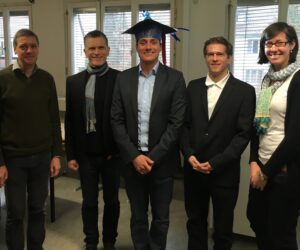today Enrico Steiger successfully defended his PhD thesis about “Explorative Spatial and Temporal Human Mobility Analysis from User-Generated Data” at GIScience Heidelberg University.
The massive amount of pervasive, user-generated data creates new possibilities to discover and utilize geographic information. Tied in with this novel role of actively participating users, is a growing research challenge where the reliability of user-generated social media data as a useful and trustworthy source for the discovery of geographic information is questionable. Despite ongoing research efforts to utilize user-generated datasets in various application domains, there is a lack of methods for spatial analysis that consider the quantity and credibility of these new data types from location-based social networks such as Twitter.
Furthermore, only sporadic research attempts have been made that investigate the spatial processes of people and their social activities reflected in social media for the study of human mobility.
The dissertation introduces novel concepts, techniques and analysis methods for the exploration of spatiotemporal and semantic patterns of human social activities from usergenerated social media data. The main focus of the conducted research is to investigate the possibilities of characterizing spatial structures and underlying human mobility patterns, in order to assess the reliability of uncertain social media information and given spatial, temporal and semantic attribute characteristics.
We concratulate him cordially to this fine work. Well done Enrico! 🙂
The thesis is related to the following four main and three additional publications:
Steiger, E., de Albuquerque, J. P., Zipf, A. (2015): An advanced systematic literature review on spatiotemporal analyses of Twitter data. Transactions in GIS. (Published online) DOI:10.1111/tgis.12132
Steiger, E., Westerholt, R., Resch, B., Zipf, A. (2015): Twitter as an indicator for whereabouts of people? Correlating Twitter with UK census data. Computers, Environment and Urban Systems, CEUS, 54, pp. 255-265. DOI:10.1016/j.compenvurbsys.2015.09.007
Steiger, E., Resch, B., Zipf, A. (2015): Exploration of spatiotemporal and semantic clusters of Twitter data using unsupervised neural networks. International Journal of Geographic Information Science, IJGIS (Published online) DOI:10.1080/13658816.2015.1099658
Steiger, E., Resch, B., de Albuquerque, J. P., Zipf, A.: Mining and correlating traffic events from human sensors observations with official transport data using self-organizing maps. Transportation Research Part C: Emerging Technologies. (minor revision)
Steiger, E., Lauer, J. Ellersiek, T. Zipf, A. (2014): Towards a framework for automatic geographic feature extraction from Twitter. Eighth International Conference on Geographic Information Science. Vienna, Austria.
Steiger, E., Ellersiek, T., Zipf, A. (2014): Explorative public transport flow analysis from uncertain social media data. Third ACM SIGSPATIAL International Workshop on Crowdsourced and Volunteered Geographic Information (GEOCROWD) 2014. In conjunction with ACM SIGSPATIAL 2014. Dallas, TX, USA. DOI:10.1145/2676440.2676444
Steiger, E., Ellersiek, T., Resch, B., Zipf, A. (2015): Uncovering latent mobility patterns from Twitter during mass events. In: Strobl, J., Blaschke, T., Griesebner, G. (Eds.). full paper GI_Forum – Journal for Geographic Information Science, 1-2015, pp. 525-534. DOI:10.1553/giscience2015s525
Further Enrico published some additional publications related to social media, VGI, OSM and OpenRouteService.



